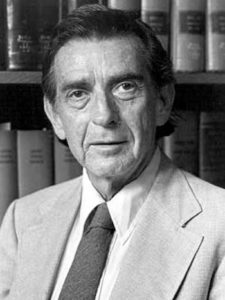
Charles Black
*Charles L. Black Jr. was born on this date in 1915. He was a white-American Professor and authority in constitutional law.
From Austin, TX., he was one of three children of Charles L. Black Sr., a lawyer, and Alzada Bowman Black. He graduated from Austin High School at 16 in 1931 and enrolled at the University of Texas, focusing on Greek classics.
After receiving his bachelor’s degree in 1935 and traveling to Europe, he enrolled at Yale and earned a master's degree in Old and Middle English Literature. He graduated from Yale Law School in 1943. After his military discharge, he later served in the Army Air Corps as a teacher and practiced Law for a year with the New York firm of Davis, Polk and Wardwell, Sunderland & Kiendl.
With a desire to teach, he joined the Columbia law faculty in 1947 and became a full professor shortly afterward. In 1954, Black helped Thurgood Marshall and the NAACP Legal Defense and Educational Fund Inc. to write the legal brief for Linda Brown, a 10-year-old girl in Topeka, Kan. This historic case, Brown vs. the Board of Education, became the Supreme Court's ultimate judgment on segregation in American schools. Soon after, he married Barbara Aronstein.
Black taught generations of law students, first at Columbia from 1947 to 1956, then at Yale for 30 years, then again at Columbia from 1986 until his health began to fail in 1999. Among his students were Hillary Rodham Clinton and countless others who later became government, business, or academic leaders. Black wrote more than 20 books and hundreds of articles on constitutional law, admiralty law, capital punishment, the role of the judiciary, and other subjects.
He was widely praised for his book, "Impeachment: A Handbook," in 1974 when President Richard M. Nixon resigned in the Watergate Scandal, and also when reissued during the 1999 proceedings against President Bill Clinton. Black was a prominent voice in national debates on presidential impeachments, desegregation, the death penalty, and other issues.
Charles Black taught at Columbia and Yale Universities for 52 years; he died May 5th, 2001.
David W. Leebron, Remembering Charles L. Black, 111 Yale L.J. 1889-891 (2002)
Thomas Black, Recollections of a Brother and a Friend, 111 Yale L.J. 1893-1895 (2002)
Jack B. Weinstein, Some Memories of Charles L. Black, Jr. 111 Yale L.J. 1897-1900 (2002)
Guido Calabresi, Charles Black: Gentle Genius, 111 Yale L.J. 1901-
1903 (2002)